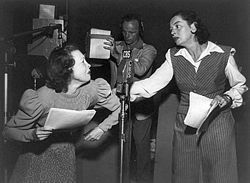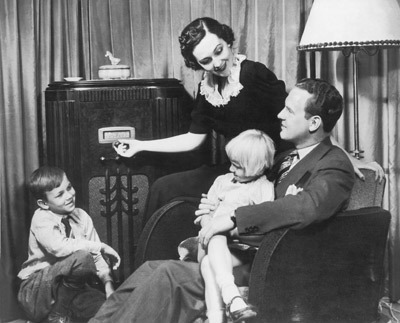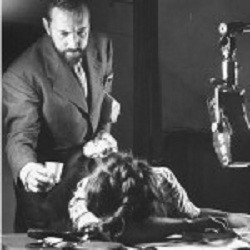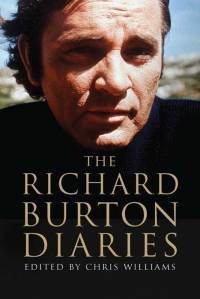Terry Teachout's Blog, page 131
October 1, 2012
TT: Lookback
 From 2006, some thoughts on the death of Elisabeth Schwarzkopf:
From 2006, some thoughts on the death of Elisabeth Schwarzkopf:We are all flawed creatures, and one of the impenetrable mysteries of beautiful art is that it can be made by ugly souls. So feel free to mourn the death of Elisabeth Schwarzkopf, and to speak admiringly of her artistry--but when you do so, remember that there was more to her than the music she made....
Read the whole thing here .
Published on October 01, 2012 22:00
TT: Almanac
"He didn't have anything to say about death; the only thing he ever had anything to say about was music. From his own point of view as a pianist and trumpet player he could tell you whether a piece was hard or easy; in a larger sense, as critic, he could say right off whether a thing was good or bad. His instinctive taste was infalllible within the bounds of his chosen field. Outside of that he was deaf, dumb, blind, even slightly halt and more or less lame. What was death to him; what was plane geometry; what was Spanish Conversation and Composition?"
Dorothy Baker, Young Man With a Horn
Dorothy Baker, Young Man With a Horn
Published on October 01, 2012 22:00
TT: Turn, magic wheel!
 The great engine of publicity is starting to have its way with
Satchmo at the Waldorf
, which begins public performances in New Haven this Wednesday. On Friday the New Haven Register ran an interview with John Douglas Thompson written by Donna Doherty, the paper's arts editor:
The great engine of publicity is starting to have its way with
Satchmo at the Waldorf
, which begins public performances in New Haven this Wednesday. On Friday the New Haven Register ran an interview with John Douglas Thompson written by Donna Doherty, the paper's arts editor:The play captures a wistful [Louis] Armstrong looking back on his career and some of the choices he made, questioning whether the price was too high or whether he made the correct choice, including his relationship with [Joe] Glaser. But the audience, when [John Douglas] Thompson is in the Glaser character, learns some of the behind-the-scenes maneuverings that Armstrong never knew about, some good, some bad.
Thompson says he can identify with Armstrong as a person of the same race, and though Glaser was white, "What I have in common with him is we come from the human race. That's enough for me to work my way in. But it's always the writing, always the playwright to open the door. If you don't have their words to open the door, it's not going to work.
"My performance has been constructed out of Terry's imagination. He gave me something to follow. Then you have someone like Gordon [Edelstein], who's really vigilant at culling things out of words, putting things around you, whether it's lighting or props. This is one of those times when me, Terry and Gordon, it's been this truly creative process...."
To read the whole thing, go here .
On Sunday the Hartford Courant ran a feature story by Frank Rizzo, the paper's drama critic:
There was more to jazz great Louis Armstrong than what people saw on "The Ed Sullivan Show," says Terry Teachout, who wrote a comprehensive biography of the beloved performer titled "Pops: A Life of Louis Armstrong."
Teachout, who is also theater critic for The Wall Street Journal, gives his story a theatrical life in "Satchmo at the Waldorf," which begin performances Wednesday, Oct. 3, at New Haven's Long Wharf Theater, staged by its artistic director Gordon Edelstein. The production had a late summer run in the Massachusetts Berkshires at Shakespeare & Company in Lenox....
"This is not just storytelling but a real play with real conflict," says Teachout, who says he has no problems being on the other side of the critical pen. "This is more than what Gordon calls 'a taxidermy play,' which is a famous guy sitting around talking for two hours about what a great guy he is."...
To read the whole thing, go here .
Published on October 01, 2012 10:57
September 30, 2012
TAKING A SECOND LOOK AT NEIL SIMON
"
Alas for Simon
, Lost in Yonkers was not a new beginning but an end. Never again would Simon write a full-fledged stage hit or a commercially viable screenplay, and none of his plays has been successfully revived on Broadway, save as a star vehicle (like the 2005 production of The Odd Couple with Nathan Lane and Matthew Broderick). The most recent attempt, a 2009 revival of Brighton Beach Memoirs, whose original 1983 production had a 1,299-performance run, closed in a week..."
Published on September 30, 2012 23:47
TT: When radio wasn't
 I've been so preoccupied with
Satchmo at the Waldorf
, which opens in New Haven on Wednesday, that I haven't been paying nearly enough attention to this blog. I meant, for instance, to write a lengthy posting about something important that happened fifty years ago yesterday and is now almost entirely forgotten. Alas, I didn't have time to do it justice, so merely mentioning it today will have to suffice: CBS pulled the plug on the last two surviving network radio dramas,
Suspense
and
Yours Truly, Johnny Dollar
, on September 30, 1962.
I've been so preoccupied with
Satchmo at the Waldorf
, which opens in New Haven on Wednesday, that I haven't been paying nearly enough attention to this blog. I meant, for instance, to write a lengthy posting about something important that happened fifty years ago yesterday and is now almost entirely forgotten. Alas, I didn't have time to do it justice, so merely mentioning it today will have to suffice: CBS pulled the plug on the last two surviving network radio dramas,
Suspense
and
Yours Truly, Johnny Dollar
, on September 30, 1962.Both series had had long and successful runs--Suspense made its debut in 1942, Johnny Dollar in 1949--but the lights started to go out on old-time radio drama as early as 1948, the year when TV finally got going in earnest. The surprising thing, truth to tell, is that it lasted as long as it did, all the way into the Age of Camelot.
The ranks of those who remember what golden-age radio meant to those who grew up with it are shrinking by the hour. I'm far too young to qualify, of course, but I've always been fascinated by what is now called "old-time radio," and in 1996 I wrote a column for the now-defunct magazine Civilization in which I tried to explain how central it had been to American life in the first half of the twentieth century:

Once upon a time there was radio, and it was beloved. Nobody loves TV: we take it for granted, like air or water. Radio was different. America is a big country, so big that newspapers and express trains did little to shrink it, and for most of its long history it was intensely provincial, simply by virtue of its vastness. Unless you were rich enough to travel, you knew only your town and the places nearby; the rest you read about in books, or visited once in a blue moon. But then radio came along, and all at once Americans could hear each other, no matter where they lived. You twisted a knob on the Atwater Kent in the living room in Dubuque or Diehlstadt, and suddenly you could hear Fred Allen cracking bone-dry jokes in a studio in Manhattan--or Ed Murrow standing on a London rooftop, listening to the German bombers roar through the night sky. And all of it was live: it happened and you heard it, just like that.
Indeed you did--but a time eventually came when ordinary people started to take the miracle for granted. In due course it was superseded by yet another, gaudier miracle, and that was that.
I wonder who (if anybody) was listening to the CBS Radio Network on the night of September 30, 1962. A couple of months ago I wrote a "Sightings" column for The Wall Street Journal in which I argued that 1962 was the year in which the world of postmodernity first started to take recognizable shape. I cited the premiere of Edward Albee's Who's Afraid of Virginia Woolf? as an example of how America was in the process of breaking with what I called "the earnest, self-confident tone of postwar culture." How amazing, then, to think that Virginia Woolf opened on Broadway just thirteen days after Suspense and Johnny Dollar breathed their last. Sometimes--maybe most of the time--nothing much happens when worlds collide.
 Forgive me for quoting myself yet again, but I wrote a sentence in the introduction to the
Teachout Reader
that strikes me as worth recalling in this connection: "I feel the temptation to live in the past, but one can truly live only in the moment, and the last thing I want to do is end up like the pathetic narrator of 'Hey Nineteen,' the Steely Dan song about a no-longer-young baby boomer who tries to tell his teenaged girlfriend about Aretha Franklin but discovers that 'she don't remember/The Queen of Soul,' subsequently realizing that 'we got nothing in common/No, we can't talk at all.'"
Forgive me for quoting myself yet again, but I wrote a sentence in the introduction to the
Teachout Reader
that strikes me as worth recalling in this connection: "I feel the temptation to live in the past, but one can truly live only in the moment, and the last thing I want to do is end up like the pathetic narrator of 'Hey Nineteen,' the Steely Dan song about a no-longer-young baby boomer who tries to tell his teenaged girlfriend about Aretha Franklin but discovers that 'she don't remember/The Queen of Soul,' subsequently realizing that 'we got nothing in common/No, we can't talk at all.'"I still feel that way, but it doesn't stop me from listening to old episodes of Dragnet or Gunsmoke (both of which were better on radio than on TV) and wishing that I could turn back the clock to a time I never knew. The English language needs a word whose definition would be "nostalgia for that which one has not experienced." That's how I feel about the lost world of old-time radio. No, I wouldn't want to live there, but I have a feeling that it would be a very, very nice place to visit.
* * *
To listen to the final episode of Suspense, go here .
To listen to the final episode of Yours Truly, Johnny Dollar, go here .
Jeff Kallman takes note of the golden anniversary of the end of network radio drama.
A scene from Woody Allen's Radio Days:
Published on September 30, 2012 22:58
TT: Just because
Jacques d'Amboise and Ruth Sobotka dance the prologue from George Balanchine's Apollo on the CBC in 1960:
(This is the latest in a series of arts-related videos that appear in this space each Monday and Wednesday.)
(This is the latest in a series of arts-related videos that appear in this space each Monday and Wednesday.)
Published on September 30, 2012 22:00
TT: Almanac
"He dressed like a college boy, his hands were clean, and there was nothing much wrong with the way he talked, but there was something in his face that marked him as no college boy. It was the tight, nervous face of a man who knows something, the kind of face that goes with passion of whatever sort. You see it in revolutionaries, maniacs, artists--in anyone who knows he will love one thing, for good or ill, until he dies."
Dorothy Baker, Young Man With a Horn
Dorothy Baker, Young Man With a Horn
Published on September 30, 2012 22:00
September 28, 2012
PERFORMERS' CREDO: WRITE WHAT YOU KNOW
"
It's not
a knock on performers to point out that they tend not to write well about anything else. To become a first-rate actor or musician requires a ruthless single-mindedness that leaves little time for secondary pursuits..."
Published on September 28, 2012 19:52
September 27, 2012
TT: Almanac
"However devoutly a girl may worship the man of her choice, there always comes a time when she feels an irresistible urge to haul off and let him have it in the neck."
P.G. Wodehouse, Joy in the Morning
P.G. Wodehouse, Joy in the Morning
Published on September 27, 2012 20:10
TT: The performer at the typewriter
In today's Wall Street Journal "Sightings" column, I use the publication of
The Richard Burton Diaries
as an occasion to reflect on performers who write--and what they write about. Here's an excerpt.
* * *
If you read the excerpts from Richard Burton's diaries that were serialized earlier this month in London's Daily Telegraph, you learned that he enjoyed sleeping with Elizabeth Taylor and appears to have regarded most of his other colleagues with fathomless contempt: "Marlon [Brando] has yet to learn to speak....I love Larry [Olivier] but he really is a shallow little man with a mediocre intelligence but a splendid salesman....Why do the audience look at Paul Scofield and not me? He walks like a pimp, he's got a patently false voice." One might well suppose that he had no interests other than gossip, money, drink and sex.
 In fact, there's quite a bit more to "The Richard Burton Diaries" than that. Among other things, Mr. Burton turns out to have been an exceedingly literate man who had shrewd opinions about the many books that he read. Here, for instance, is what he thought of Anthony Powell's "A Dance to the Music of Time": "He gives the impression of a deliberately distant artist. His canvas is large but he stands a long way off and paints with a remote brush only in the corners and only miniatures."
In fact, there's quite a bit more to "The Richard Burton Diaries" than that. Among other things, Mr. Burton turns out to have been an exceedingly literate man who had shrewd opinions about the many books that he read. Here, for instance, is what he thought of Anthony Powell's "A Dance to the Music of Time": "He gives the impression of a deliberately distant artist. His canvas is large but he stands a long way off and paints with a remote brush only in the corners and only miniatures."
Would that Mr. Burton had felt moved to express himself on such matters at greater length. The thought definitely crossed his mind. In a 1970 diary entry, he actually confesses to having once "contemplat[ed] retirement from acting and writing instead--not for a living, not for money....I wanted to write because I sought for some kind of permanence, a cover-bound shot at immortality and not a rapidly dating film and acting [career] to match." Had he done so, he could have become one of the handful of performing artists who've written interestingly about something other than themselves.
It's not a knock on performers to point out that they tend not to write well about anything else. To become a first-rate actor or musician requires a ruthless single-mindedness that leaves little time for secondary pursuits....
* * *
Read the whole thing here .
* * *
If you read the excerpts from Richard Burton's diaries that were serialized earlier this month in London's Daily Telegraph, you learned that he enjoyed sleeping with Elizabeth Taylor and appears to have regarded most of his other colleagues with fathomless contempt: "Marlon [Brando] has yet to learn to speak....I love Larry [Olivier] but he really is a shallow little man with a mediocre intelligence but a splendid salesman....Why do the audience look at Paul Scofield and not me? He walks like a pimp, he's got a patently false voice." One might well suppose that he had no interests other than gossip, money, drink and sex.
 In fact, there's quite a bit more to "The Richard Burton Diaries" than that. Among other things, Mr. Burton turns out to have been an exceedingly literate man who had shrewd opinions about the many books that he read. Here, for instance, is what he thought of Anthony Powell's "A Dance to the Music of Time": "He gives the impression of a deliberately distant artist. His canvas is large but he stands a long way off and paints with a remote brush only in the corners and only miniatures."
In fact, there's quite a bit more to "The Richard Burton Diaries" than that. Among other things, Mr. Burton turns out to have been an exceedingly literate man who had shrewd opinions about the many books that he read. Here, for instance, is what he thought of Anthony Powell's "A Dance to the Music of Time": "He gives the impression of a deliberately distant artist. His canvas is large but he stands a long way off and paints with a remote brush only in the corners and only miniatures."Would that Mr. Burton had felt moved to express himself on such matters at greater length. The thought definitely crossed his mind. In a 1970 diary entry, he actually confesses to having once "contemplat[ed] retirement from acting and writing instead--not for a living, not for money....I wanted to write because I sought for some kind of permanence, a cover-bound shot at immortality and not a rapidly dating film and acting [career] to match." Had he done so, he could have become one of the handful of performing artists who've written interestingly about something other than themselves.
It's not a knock on performers to point out that they tend not to write well about anything else. To become a first-rate actor or musician requires a ruthless single-mindedness that leaves little time for secondary pursuits....
* * *
Read the whole thing here .
Published on September 27, 2012 20:10
Terry Teachout's Blog
- Terry Teachout's profile
- 45 followers
Terry Teachout isn't a Goodreads Author
(yet),
but they
do have a blog,
so here are some recent posts imported from
their feed.



